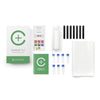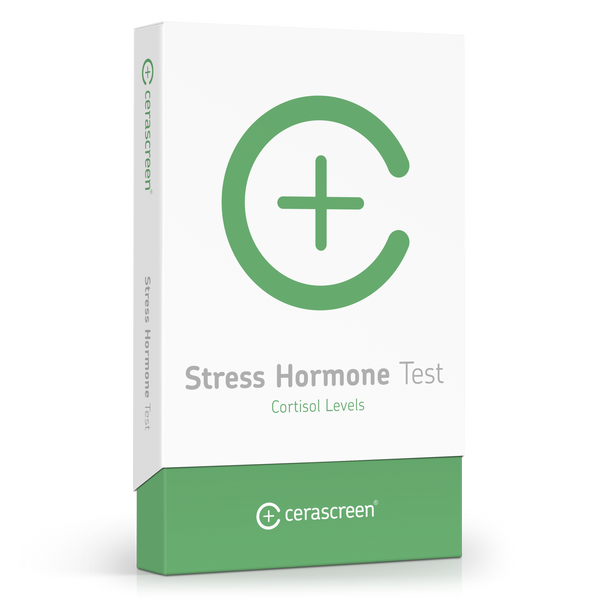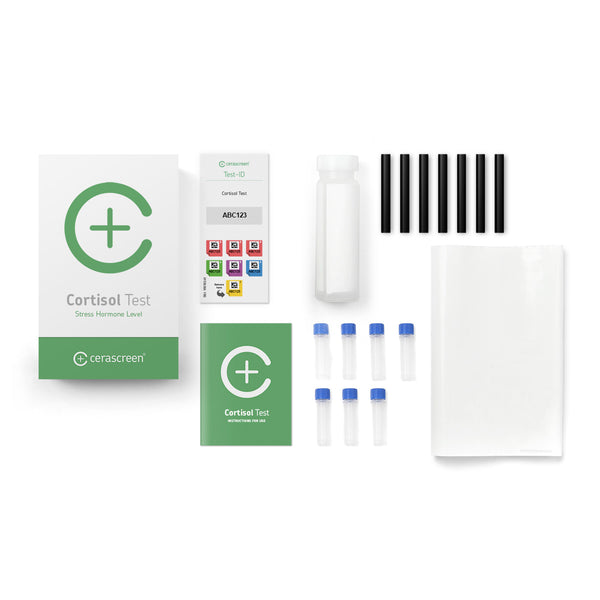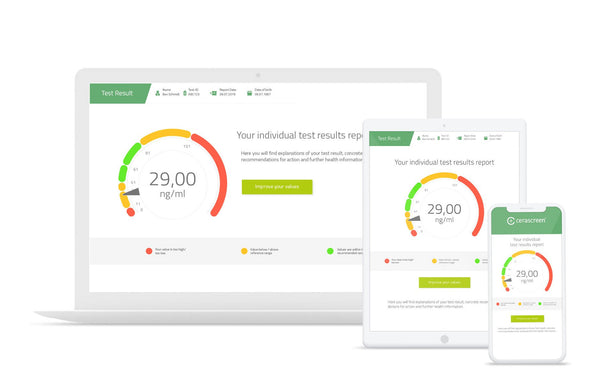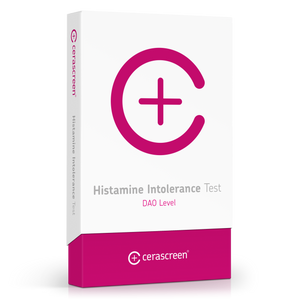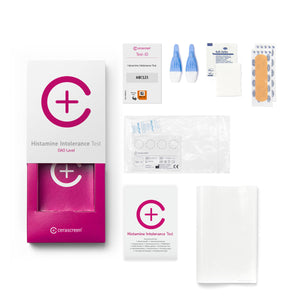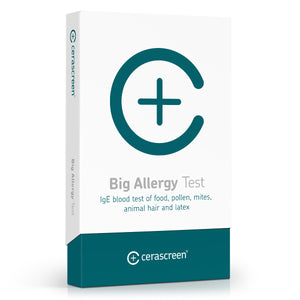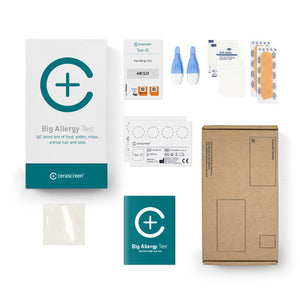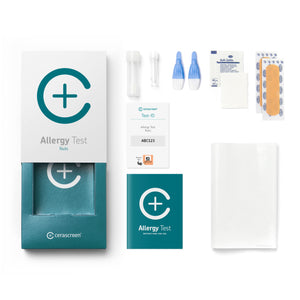product_id = 9826195015variant_id = 38259898695template_name =
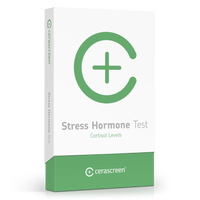
Cortisol Test (stress hormone)
About the test
The cerascreen® Cortisol Test is a test kit that is helps you find out your cortisol levels. Using this test kit, you can have the concentration of the stress hormone cortisol in your saliva determined. The laboratory analysis will detect deviations in the samples you are taking during the day, and provides you with an indication of chronic stress as well as burnout syndrome and allows you to take active countermeasures.
Do you feel increasingly stressed? Chronic stress not only makes you feel restless and unwell and less able to perform. It also means that your cortisol levels remain high for a long period of time, leading to higher blood sugar levels and increasing your risk of developing both physical and mental illnesses.
Cortisol Test (stress hormone)
- Take your sample at home – conveniently and discreetly
- Receive a state-of-the-art laboratory analysis
- Get an idea of your cortisol levels
- Save time: no waiting time, no doctor’s visit
- Receive the result within a few days after your sample’s arrival at the laboratory
Symptoms of abnormal cortisol levels
Elevated cortisol levels or a noticeable curve in cortisol levels throughout the day are often a sign of chronic stress or risk of burnout. This can manifest itself through various symptoms, for example::
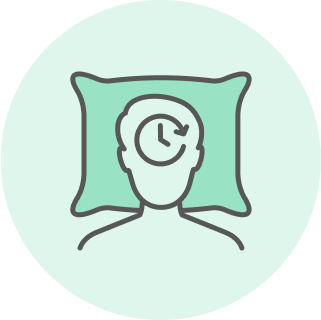
Insomnia:
It has been proven that people who suffer from chronic stress also sleep less. Excessively high cortisol levels in the evening can keep the body active and make it difficult to fall asleep. In studies, people who were under stress and had higher cortisol levels also slept less.

Headache:
Stress is a typical trigger for tension headaches and migraines. For tension headaches scientists also found a connection to cortisol: sufferers had higher levels of the stress hormone than healthy people.

Susceptibility to infection:
Studies show that people whose cortisol levels deviate significantly are more likely to suffer from infections such as colds. Cortisol counteracts inflammation in the body and thus supports the immune system. However, the Cortisol levels are constantly too high due to constant stress, "dulling" the immune cells and the anti-inflammatory effect of the hormone wears off.

Stress symptoms:
Other stress symptoms include fatigue, weight gain, skin rashes, abdominal pain,back problems and dizziness.
Benefits of the Cortisol Test (stress hormone)
More and more people are overwhelmed by stress. The pressure of being constantly available, of being successful and facing increased demands and deadlines – these causes of stress are part of everyday life. If these lead to chronic stress, your cortisol (also known as stress hormone) levels are constantly too high. And that can impact your mental and physical health.
You can easily test your cortisol levels at home. With our at-home health tests, you can take your health into your own hands. Simply take a sample at home, send it by post and receive an analysis from the certified laboratory.
Optimise your cortisol levels and reduce stress levels. Once you know your cortisol levels, you can take active steps to reduce everyday stress in a targeted way. Learn about effective relaxation techniques, improve your sleep regime, optimise your diet. We will show you how to do it!

Result of the Cortisol Test (stress hormone)
As soon as your sample has been analysed, you will receive your results report via the My cerascreen® app or your user account on our website. You can easily view the report on your smartphone, tablet or computer and print it out, if required.
Find out the cortisol concentration in your saliva at different times of the day in the laboratory analysis. Receive clear recommendations that you can use to improve your cortisol levels and stress levels through your lifestyle. Learn how the stress hormone works in your body and why it can be harmful to your health.
Frequently asked questions about Cortisol Test (stress hormone)
Why take the Cortisol Test?
Today, we have to be constantly available, strike a perfect work–life balance, and face growing challenges at work. On top of that, we have countless appointments and stress even when we’re not working. For many of us, this causes the level of the stress hormone cortisol to increase in the long run.Deviating cortisol levels can be an indication of chronic stress and burnout. But if you know about your cortisol levels, you can take action yourself and adjust your lifestyle. Good sleep, regular exercise, relaxation techniques and stress management programmes often help. This way, you take your health into your own hands and counteract the consequences of unhealthy cortisol fluctuations.A deficiency or excess of cortisol can also be a sign of a disease. If you detect and treat such a disease at an early stage, you can significantly increase your well-being.
Who should take the Cortisol Test?
With a small straw, which is included in the test kit, collect some saliva into a sample tube. Over the course of one day, fill seven tubes with your saliva. Then send your seven samples in the return envelope to our specialised laboratory.
Please note: You should do the test when you are healthy. Infections such as a cold or flu can affect the results, as can alcohol consumption. Certain medications such as hydrocortisone and corticosteroids will also affect cortisol values. You can find more information on how medicines influence test results in our FAQ.
What does the results report tell me?
You get an overview of your cortisol levels at different times of the day. Cortisol levels are typically highest in the morning and then they continuously decrease until the evening. Learn whether your cortisol values are too high or too low at certain times.
The results report also provides you with typical daily cortisol levels for chronic stress, acute stress and burnout syndrome. You can compare your values with these curves and get an indication of whether you are suffering from too much stress.
How long does the analysis take in the laboratory?
Once your sample has arrived at the laboratory, it will be analyzed there by specialists. How long the analysis takes depends on the exact measuring method and the processes in the laboratory.
If the sample is sent on the correct days (Sunday to Tuesday), this makes it easier for the laboratory to adhere to the times.
For the Cortisol test, the laboratory analysis is usually completed within 5 working days after the sample is received in the laboratory.
What recommendations will I receive?
In the results report, we will provide you with recommendations that you can use to normalise your cortisol levels.
Our recommendations for action include tips on diet, supplements and relaxation techniques.
Why do I take 7 samples and get 5 values?
The Cortisol Test result report provides you with five values of your cortisol level at different times of the day. The first three testings of the day are included in the morning value. In this way we can ensure that we give you a reliable and meaningful result for the morning value, because in the morning the cortisol level is still subject to strong fluctuations. For the other four times of the day you then only need to take one sample each.
What is cortisol?
The vital hormone cortisol (also called hydrocortisone) is often called the stress hormone. Our body produces it in the adrenal cortex.
Cortisol levels fluctuate throughout the day. It is highest in the morning, then it gradually decreases and reaches its lowest point around midnight.
Why do I need cortisol?
Cortisol is released in stressful situations and when we feel under threat, along with adrenaline. Stress hormones make your body release energy, make you awake and alert, and suppress digestion and the immune system. These factors mean you are optimally equipped for a stressful fight-or-flight situation.
Cortisol has other functions in the body:
- It regulates blood sugar and blood pressure
- It is involved in fat, protein and carbohydrate metabolism
- It inhibits inflammation – including that caused by other hormones such as adrenaline during a stressful situation
What happens if I have a cortisol deficiency?
If there is too little cortisol in the body, it is often related to a sick kidney. If you have an underactive kidney, your body does not produce enough cortisol. This is called Addison’s disease. Burnout syndrome can also lead to a cortisol deficiency.
Cortisol deficiency symptoms include:
- Weight loss, loss of appetite and gastrointestinal problems
- Dizziness, fatigue and feeling weak
- Depression, irritability and decreased libido
- Hair loss
What are the causes of excess cortisol?
Your cortisol levels rise when you are under pressure. Our ancestors used stress to survive. Stressful situations were usually short-lived, after which our hunter-gatherer ancestors were able to recover.
Today, the demands of the job, family and deadlines leave many people constantly under stress. As a result, our bodies remain in a state of tension. Cortisol levels are constantly too high.
What happens if cortisol levels are too high?
When cortisol levels are too high throughout the day, this is classed as a cortisol excess. Chronic stress is a common reason for this – a body that is always expecting danger and stress also constantly tries to prepare itself for threats with stress hormones.
Other possible causes are pregnancy, severe obesity, depression, Cushing’s disease and alcoholism. Our cortisol levels also increase with age.
Symptoms of excess cortisol include:
- Bone pain and an increased risk of osteoporosis
- Bone pain and an increased risk of osteoporosis
- Depression
- High blood pressure
- High blood sugar levels and weight gain
Who should NOT take the Cortisol Test?
The Cortisol Test (Stress Hormone) is not or only partially suitable for certain groups of people:
People with infectious diseases, like hepatitis and HIV, may not use the Cortisol Test.
People with haemophilia should not take the test.
Pregnant and breastfeeding women should only take the Cortisol Test under medical supervision. The given reference ranges and recommendations do not apply to people in this group; consult your medical professional for advice concerning your test results.
The Cortisol Test is not intended for children under 18 years of age.
The test is not intended for diagnosing illnesses or disease. For example, if you suffer from depression or are in physical pain, consult a doctor.
Why are children under 18 not allowed to take the test?
Our tests are not suitable for underage children and adolescents under the age of 18. Under 18s cannot activate the tests online and therefore cannot receive a test result. We ask that you do not administer the tests to your children either.
Children and adolescents need much closer supervision and counselling regarding medical tests and their interpretation. Testing with lancets and chemicals is not without risk and would need to be closely supervised by guardians. In addition, the reference values we give are always based on adult data. In the case of children, the risk of misinterpreting the results would be very high.
We want to fulfil our responsibility as a provider of medical products and ensure that children and adolescents are not unsettled by measurement results that are difficult for them to interpret. Since we cannot control whether the minors' legal guardians actually consent to the test being carried out and supervise them, we exclude tests for under 18s altogether.
If you are under 18 and have purchased a test, please contact our customer support.
Why does it take up to a week for the sample to reach the lab?
Please bear in mind that your results will not be analyzed in the UK but in Germany. For that reason, it can take up to a week for the sample to arrive at the lab. This does not affect the stability of the samples, as the method we are using is optimized for long transports.
Initially, your sample is sent to our collection center in the UK. From there, it is shipped to our central sample sorting facility in Germany, which then distributes samples to our partner laboratories. Once your sample is analyzed there, you will receive a notification and can access your result online.
Please check your mailbox regularly. We will notify you as soon as your sample is sent, arrives, or is analyzed.
Why does the test have an expiration date?
The cerascreen® test kits are CE-marked medical devices, which in turn include other certified medical components such as lancets, patches, and alcohol swabs used in blood tests.
Like most medical devices, these components have an expiration date to ensure that they remain safe and effective. Many of our sample carriers – such as dried blood cards or sample tubes – are chemically treated to keep your sample stable and analyzable in our laboratory. Over time, environmental factors can affect this treatment and compromise accuracy.
Our sterile, single-use lancets also carry an expiration date to guarantee sterility and safe use up to that time.
This is how it works
1. Test at home
Your test kit contains everything you need to take a small saliva sample. Then send the sample back to us free of charge in the enclosed return envelope.
2. View results online
After the evaluation in the medical specialist laboratory, you will have online access to your personal result report.
3. Act
Your access to the test results and the evidence-based findings and tips to improve your health: the my cerascreen® user profile on our website or our app.



